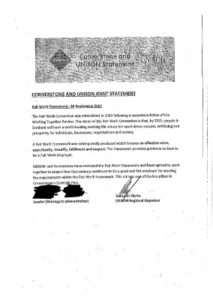 Cornerstone UNISON members will remember that we are sharing some of the agreements that have been reached with Cornerstone in recent times, with an explanation of what they mean for our members.
Cornerstone UNISON members will remember that we are sharing some of the agreements that have been reached with Cornerstone in recent times, with an explanation of what they mean for our members.
Today, it’s the turn of the Fair Work Framework Agreement, which was signed by Cornerstone and UNISON on 26the Sept 2017. This is an interesting agreement as UNISON has been heavily involved in Fair Work with the Scottish Government, and the Cornerstone Chief Executive is a Fair Work Ambassador for the Scottish Government.
The pillars of the framework are:- Effective Voice, Opportunity, Security, Fulfilment, and Respect.
The Fair Work Framework states:-
- That an Effective Voice for workers was most evident where Trade Union recognition is in place. UNISON would argue this is because of the formal structures and agreements that allow grassroots issues to be advanced by staff members on an equal footing with senior management. Staff should never be fearful of speaking their minds; UNISON ensures that they don’t need to be.
- Opportunity of access to Fair Work is assisted by investing in and utilising Trade Union Equality Reps, Learning Reps, and Workplace Reps. Again, this is improved through the formal training that UNISON reps undertake, helping the organisation to make the correct decisions on access requirements for those who need them.
- Job Security is vital to the whole concept of Fair Work and this can mean both in terms of secure employment, and secure access to pay and benefits. The Framework makes clear reference to collective bargaining in unionised establishments being supported. This is delivered in Cornerstone through the recognition agreement which allows us to negotiate all terms and conditions on behalf of all staff with the employer. It also manifests in our ability to review new job roles to prevent the devaluing of jobs and wages over a longer term. The process of checks and balances that trade union recognition provides is critical.
- Fulfilment at work is critical. A happy, valued member of staff who does work of substance will give more to their employer than one who is expected to carry out tasks in a robot like manner. In many cases this requires organisational development where the expertise and skills of the trade union is key in upskilling staff and ensuring appropriate rates of pay, such as in our work around the LCAST Pilot.
- Respect should be mutual and stretches from ensuring the well being of staff in terms of health and safety, to preventing bullying, to acknowledging the contribution that staff at all levels of the organisation can make. UNISON’s recognition agreement and input on internal policies assist Cornerstone in their ability to put appropriate measures in place. Our communication with members allow us to raise issues that are relevant on the ground and ensure that they are addressed.
The Scottish Government very clearly states that all good employers should aim to meet the standards within the Framework, and that this is good for workers, good for business, and good for Scotland. UNISON very firmly endorses this view.
It does however beg the question that during a period of significant change, such as the Local Cornerstone Project, why an employer would want to limit our involvement?
UNISON is clear that the Testing of Self Organised Teams agreement (released by us last week) went some way to counter the problems found during the failed Craigewan Pilot. Discarding those lessons, and the trade union along with them, would be folly.
